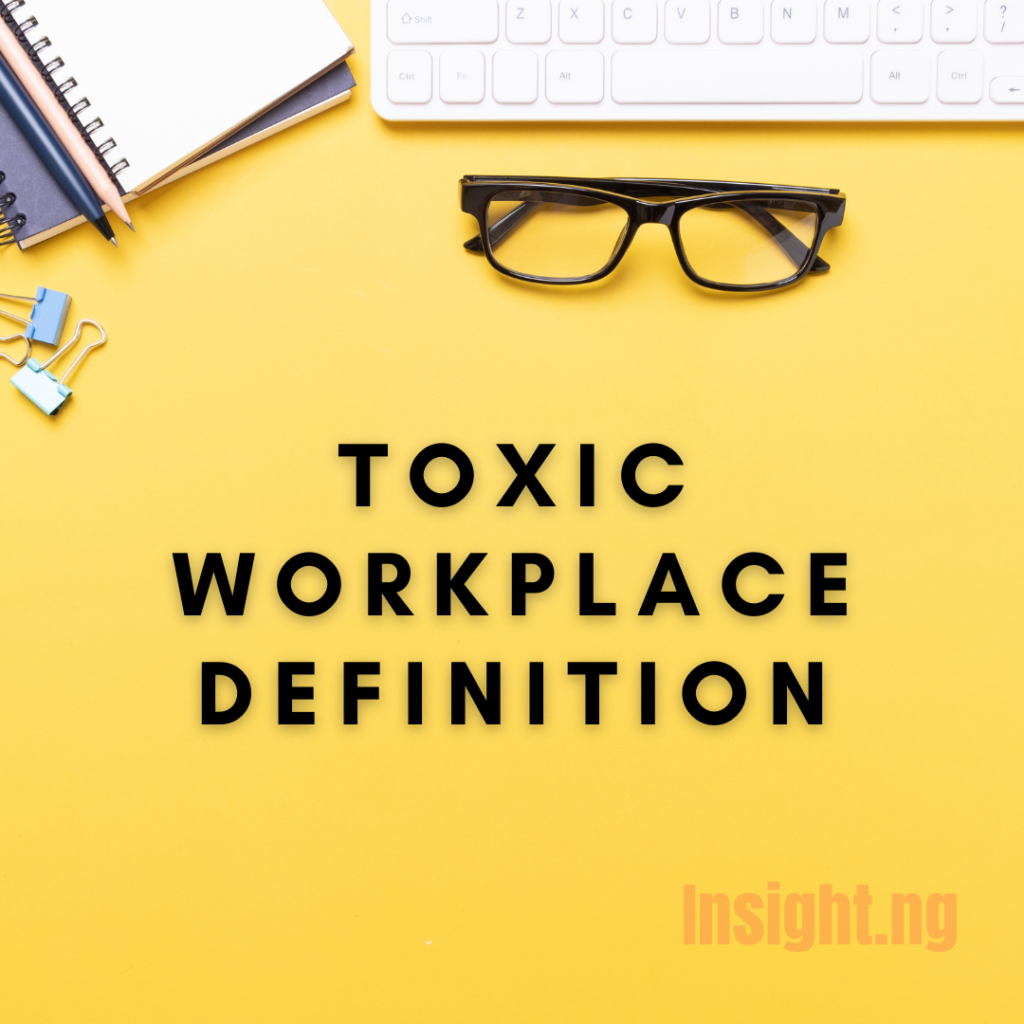Roses are red; violets are blue; a toxic workplace is lethal. Believe me! I have firsthand experience. You’d probably realise it when you’re in one; it comes with the feeling that something is off somewhere but you can’t wrap your head around it.
You’d probably think it’s just a new job and you’re still getting used to the change; believing that having immense patience would keep you going. Or even go as far as licking the feet of the right people so that things will be less, you know, bearable.
All the same, dear reader, I’ll try my best to explain from my experience and research the tale-tell signs you are in a toxic workplace. But before that, what is this toxicity I write about?
Table of Contents
Definition of a Toxic Workplace

It is more than those bad Mondays, disappointing weeks, and challenging months. It borders between staying up at night, dreading the impending doom of your workplace, and dying. Yes! It can be that serious.
A toxic workplace is simply that working environment where activities, actions, spoken words, and things done there are hazardous to you. It can be mentally, emotionally, and physically draining. It is a place not good for your health.
Now that you know your health is involved and at risk listen!
8 Signs You are in a Toxic Workplace
The following are indicators of a toxic work environment. If your workplace has one or two of these, it may be toxic. It can also be fixable, considering the intensity of it. However, if your workplace has more or all the markers mentioned below, you must flee.
-
Autocratic Boss

In a toxic workplace, your opinions don’t matter. You are treated like trash. Your supervisors/employers expect respect from you, yet they don’t return it.
They get mad when they see you working with your initiative or doing things they would have normally ordered you to do, but because they didn’t feel that euphoria of giving out the orders, they feel you’re disrespecting them.
At first, these bosses praise you in the name of encouragement for a job well done, yet they trample over you with loads of mistakes they believe you made in the same job. You can never be right with them. If you speak out, you get shouted at for disrespect and ineptitude.
Tons of rules are made by the senior staff for the organisation’s benefit, but you see, massive rules birth hypocrites. Of course, they break their own rules, but you’d be queried when you follow in their footsteps.
Most of the time, you are overworked, but you can’t complain, and can’t seek help. Over time, your health, confidence, and zeal to work dwindle. When you feel you are patient enough and cannot easily wilt under massive, unhealthy pressure, you do more harm than not.
My proffered solution is to gather all the staff. This is if you still have the courage and confidence to face the dreadful presence of your boss. Politely seek your boss’s audience, fix a date (give your boss this privilege), then, with the rest of the staff, have a heart-to-heart session with your boss or bosses.
The organisation cannot work effectively if employees are constantly treated like ragged dolls. Make them bosses see how their tone of speaking, insults and harassment, and the huge workload affect your efficiency and health.
Now, by miraculous intervention, these bosses may listen and do better. The majority of the time, though, you’d be talking to a brick wall when you make your displease known.
Other times, they may create a whole façade of doing better to make you feel like things would be better, but dear, they love power. It is what drives them. So they’d probably go back to making your life a living hell, dashing all your hopes of conducive working space.
Now, if you are the boss reading this article, examine yourself. Evaluate your actions concerning the state of your staff and organisation. There is no way your organisation can thrive with unhappy staff. You probably know your wrongdoings but find it hard to accept them. I’d suggest you see a therapist.
-
Poor communication

You wake up one morning, boom! You’ve been given a task with no explanations whatsoever. You complain about it, but you’re told that’s how the boss wants it. Dearie, that place is toxic.
Sudden, confusing, scattered communication is a bedrock of many issues in the workplace. This is because decent communication is required for the smooth running of every organisation.
A lot falls under these communication skills. They include verbal, written, listening skills, and so on. This is why when effective communication is disrupted, things get jeopardised.
In an organisation with hampered communication, projects lack clarity, employees receive different messages, passive aggression travels down the line of communication, and messages and information would be passed even after work hours. When you have to engage yourself with non-work activities with family and friends, you are forced to take work along. What a shame, right?
Bad communication is the reason organisations perform badly. First, it leads to a lack of purpose and confusion for employers and employees. Then, other problems arise and mount each other till it’s all so overwhelming.
If you are in an organisation with poor communication, you can either talks things out with your head or colleagues if you have power. You can also take action towards correcting this, but when it’s beyond your control, and you are being pulled under by bad interaction, I suggest you flee! Because it would only get worse, especially when you’re the one making major attempts to correct things.
However, if you are that person who feels communication is not necessary, I’ve got a few words for you. Get your act together.
-
Cliques, exclusion, and gossip

When you walk into a room, everyone stops talking, and it’s not because you’re gorgeous or they are in awe of your awesomeness. Instead, you notice whispers and subtle remarks when moving about your task. You see a colleague coming in with lunch for many people, and you’re excluded.
Of course, you may act like you don’t care for a while, but phew! It’s exhausting and demeaning. You’d feel alienated.
The worst part is that this group or clique might have been created based on those seen as top-notch. You know, those frequently offered projects regardless of experience or talent.
Of course, having cliques, chatting, and gossiping during office hours are unethical. It’s not just because tasks are left unattended, but because the peace of other serious staff would be constantly disturbed.
Hey, having these cliques and gossip mates is counterproductive in your workplace; avoid such groups. They are workplace bullies. Stay clear of them. No one wants to go back to primary school, where there are queen bees and jocks.
If it’s something the management can’t handle or something they encourage by giving special preferences, you should exude from the organisation.
To get updates on more insightful content like this, subscribe to our Newsletter.
-
Bad Leadership

This is more like a general outlook on the behaviours of some BOSSES. As the old saying goes, “You don’t leave a job, you leave a bad boss,” it simply means that the success of every organisation lies on the shoulders of its head.
Unfortunately, these bosses have the key in their hands. The people they employ, division of labour, communication, and accolades all lie with them.
Bad bosses come in different shades and varieties. First, we have a micromanaging boss who corrects you at all times, erodes your decisions, and, in the end, stops you from doing your job.
There are the blame game bosses, always quick to push mistakes on everyone else but themselves. Then there’s no respect, boss, who has no time restrictions; you get emails at all hours; your name is always spelled incorrectly. The funny thing is, they probably have no idea of your job description. They are more or less also known as laissez-faire bosses.
Good leadership is very crucial. It sets the atmosphere for how the work environment flows. When you are in this situation, you can try conveying these issues to a higher boss or the HR department.
Truly, heading an organisation is not easy, I know. It takes skills, experience, and patience to anchor a ship through storms and calm seas. It would help if you build up your emotional tolerance and seek help as a boss when things get overwhelming. Avoid transfer of aggression. Take a break, then come back and try again.
-
Hinders Personal and Organisational Growth

This excludes startups that need time to grow. If an organisation has been around a couple of years with little or no growth over a long period, there is a high tendency for that place to be toxic.
When you notice there are no learning opportunities for career advancement or mentorship programs, these organisations might not intend to invest in the growth of their workers. Once you realise you’re not experiencing any growth in yourself and the organisation, it is probably best to change the soil.
-
Rapid Employee Turnover

This is the rate at which workers leave an organisation and are replaced. When this is rapid, the environment is quite toxic. Leaving a good job is not a decision one makes easily, but once there’s the ease at which staff makes this decision, something fishy is going down in the workplace.
Again, when employees are frequently laid off, something is wrong somewhere. They could not be all bad eggs.
A high turnover rate can be due to a lack of direction, disorganisation, bad bosses, little to no opportunity, overworked staff, etc. You should pay attention to these. It is a sign that things are going downhill or on the verge of getting worse. If possible, have an audience with an ex-employee who resigned or was laid off.
Follow us on Twitter for more updates on building a happy and successful career.
-
No Work-Life Balance

It’s not all about work. Your whole life shouldn’t revolve around getting duties done. There should be a me-time for you, when you’re not at work. Vacations shouldn’t have work in them.
Work-life balance is essential for good health. No human is expected to be clocked in at all times. If your work requires this from you, it is toxic.
True, work emergencies may suddenly arise, but when it is expected you’re available at every summoning makes your job unhealthy.
Avoid this toxic environment as much as possible by setting decent work boundaries. If your boundaries are always breached, that work is probably not for you.
-
A toxic workplace sets off a gut feeling

If you constantly sense a bad atmosphere in your workplace, it is a warning sign. If you’re frequently anxious, experience any form of discrimination, or notice a decline in physical and emotional health, that is a big problem.
Always listen to your gut. Then, of course, you can seek a second opinion from a loved one or a dear friend. However, your gut holds all the decisions you’d need. So, try and listen to it.
If you’d like to be in the midst of other career developers like you and get updates on similar content, send us a message on whatsapp.
Conclusion
The impact a toxic workplace has on the lives of the employees cannot be overlooked because, in the long run, it will affect them psychologically. This is why it is important to avoid toxic workplaces.
Other signs of a toxic workplace include physical and sexual harassment, racism, frowns against sexual orientation, lack of material and human resources, etc.
All in all, dear reader, you have just one life; take care of it.
More from Insight.ng
8 Devastating Signs of a Toxic Relationship
How to Stay Calm Under Pressure: 7 Useful Tips
How to Develop or Improve Company or Workplace Culture
About the Author
Maryjane C. Chiedozi, a writer with an untamed passion for creativity, research and productivity, all put together to create masterpieces. Maryjane C. Chiedozi is also an author of the novel ‘Our Hearts Beat For Anne’ which can be read exclusively on GoodNovel.
About Author
- Op-Ed are articles published by guest authors. We no longer accept guest posts. However, we are still open to adding long-term content contributors to our team of insightful writers. To write for us, please check out inisght.ng/guest-post.
Latest entries
 Business InsightsMarch 27, 2024Effective Strategies for Managing Cash Flow in a Nigerian Business
Business InsightsMarch 27, 2024Effective Strategies for Managing Cash Flow in a Nigerian Business

 Business InsightsFebruary 12, 2024Privacy Policy for Business Websites: All You Need to Know
Business InsightsFebruary 12, 2024Privacy Policy for Business Websites: All You Need to Know


1 comment
Wonderful Exquisite cum excellent
Pls keep it up